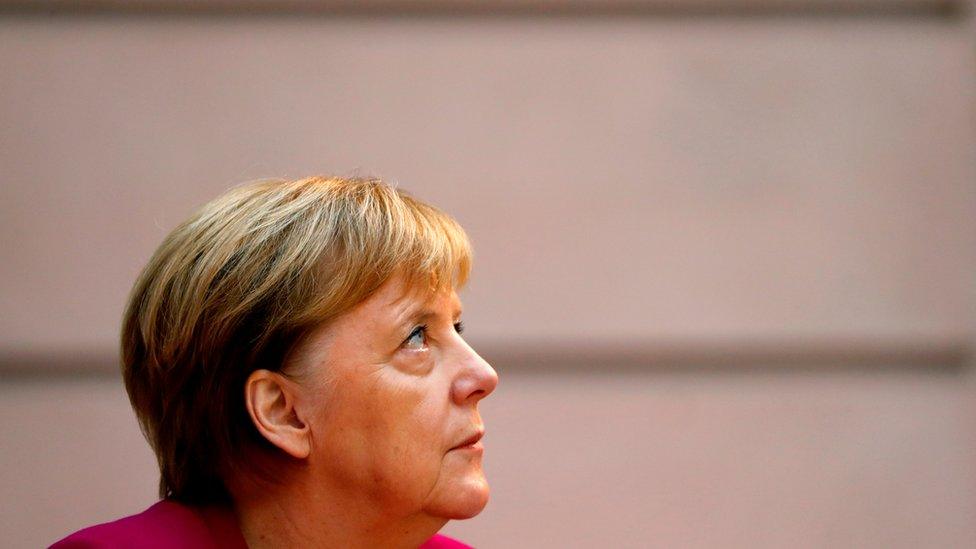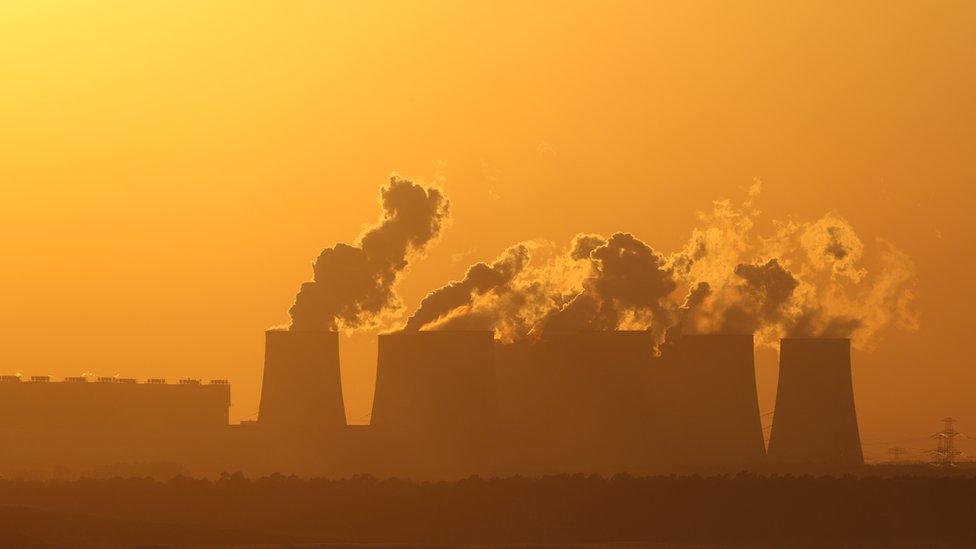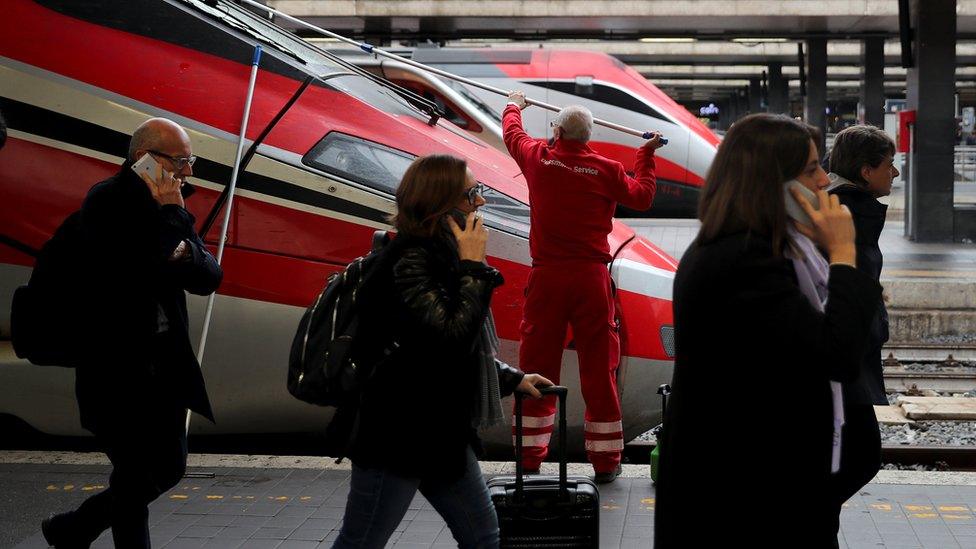Week ahead in the European Parliament
- Published

German Chancellor Angela Merkel will be the star guest this week when the European Parliament meets in Strasbourg.
Her address to MEPs on Tuesday has been in the diary for a while, part of a series of set-piece speeches on the 'future of Europe' from European leaders.
However, it is not clear how much of that future she will be able to shape given she has now set the clock ticking on her time at the Chancellery.
Indeed it is hard not to imagine that at least a few MEPs will use their interventions after her speech to deliver reviews of her chancellorship rather than her vision of the future.
And there's plenty to talk about - the Greek debt crisis and her policies towards migration in particular could get a good airing.
On the legislative front, there will be votes this week on EU targets for renewable energy, telecoms rules and rail passenger rights.
Here's what's coming up this week…
Monday
The sitting begins with a debate on an interim deal MEPs have reached with governments on new energy and climate targets for the EU.
Legislation to set the targets faces a final vote on Tuesday.
Under the deal, the EU's energy use should be 32.5% more efficient by 2030, with 32% of the bloc's energy coming from renewable sources by the same year.
The targets are more stringent than pledges made by EU states during a 2014 summit, but less than those the European Parliament initially demanded.

After this, they will debate a new multi-year plan governing the fishing of small pelagic fish - such as anchovies and sardines - in the Adriatic Sea.
MEPs have proposed amending the plan to reduce the proposed catch limits by 4% between 2020 and 2022.
It will mostly affect fisheries from Italy and Croatia, and some boats from Slovenia, Albania and Montenegro.
They will also discuss the recent flash flooding in parts of Spain, Italy and France.
Tuesday
The entire morning session will be taken up with a debate on MEPs' position on the EU's next long-term budget, the first to apply after Brexit.
On Wednesday they will set out their spending proposals in individual policy areas, ahead of negotiations with member states.
Ambitiously, they want to get the next multiannual financial framework, external, as it is known, agreed before the European elections next May.
Their draft report calls for the €1.28tn budget proposed by the European Commission to increase to €1.32tn, with spending increases in a number of areas.
It also backs Commission plans to introduce new EU taxes on non-recycled plastic packaging and revenues from the bloc's carbon trading scheme.
At the voting session they will vote on a motion expressing concern about the overhaul of the judiciary in Romania, and efforts to tackle corruption.
Angela Merkel's speech will begin at 14.00 GMT, after which MEPs will get the chance to respond.
This will be followed by debate on two reports from the foreign affairs committee reviewing EU association agreements with Georgia and Moldova.
The agreements, which increased trade and political co-operation between the two countries and the bloc, come into force during 2016.
They will also discuss a draft report calling for stronger adherence to the EU's common rules for granting arms export licences.
The 2008 rulebook contains no powers to sanction states, with MEPs warning there has been a "systematic failure" to enforce compliance.
The report - which faces a vote on Wednesday - repeats the European Parliament's request for an EU-wide arms embargo on Saudi Arabia.
In the evening they will discuss the regulation of virtual currencies and the powers of national competition authorities.
Wednesday
First up in the morning is a debate on an interim deal MEPs reached with national ministers earlier this year on an overhaul of the EU's telecoms rules.
The proposed changes to the European Electronic Communications Code will be put to a final vote later in the morning.
The revision will introduce a cap from next May on the price of intra-EU phone calls, set at €0.19 per minute, and text messages, at €0.06.
It will also oblige all member states to set up public warning systems for alerting people via their phones about emergencies and natural disasters.
After this, they will discuss legislation introducing new CO2 emission reduction targets for manufacturers of lorries and buses.
The European Commission wants to put in place a 30% reduction target for the average CO2 emissions from new trucks, to be achieved before 2030.
At lunchtime MEPs will vote on amendments suggested by the environment committee to up that target to 35% over the same period.
South African President Cyril Ramaphosa will make a speech to MEPs at 10.30 GMT, before the winner of the assembly's LUX film prize, external is announced.
The afternoon session will begin with a debate on protecting next year's European elections from interference from foreign powers.
Later MEPs will debate President Trump's decision to pull the United States out of a landmark nuclear weapons treaty with Russia.
Mr Trump has accused Russia of violating the 1987 Intermediate-Range Nuclear Forces (INF) treaty.
Russian President Vladimir Putin has threatened "retaliatory strikes" against any European country that hosts US missiles that were formerly banned.
They will also discuss President Trump's reaction to the caravan of South American migrants heading towards the US-Mexico border, and the rights of religious minorities in Pakistan in the wake of the release of Asia Bibi.
The American theme will continue in the final debate, which is on the effect on European companies of the sanctions the US imposed on Iran last week.
Thursday
A fairly quiet day begins with a debate on a report on gender equality from the assembly's women's rights committee.
The report says an unfair division of caring responsibilities between mothers and fathers, and pay and pension 'gaps' between men and women are leading to the "feminisation of poverty" in Europe.
They will also discuss what the EU Commission could do to increase public awareness of Lyme disease, before debates on this month's motions on topical human rights cases.
The motions this month will address cases in Vietnam, Cuba and Bangladesh.
At the voting session they will take an initial position on a proposed revision of EU rules on the rights of rail passengers, ahead of talks with EU governments.

Legislation which came into effect in 2009 sets out minimum standards for compensation and information provided to passengers.
Proposed amendments include rejecting plans by the EU Commission for a 'force majeure' clause exempting rail operators from paying compensation for delays caused by severe weather.
They also want compensation levels to be upped to 100% of the ticket price for delays of over two hours.
Please note: This agenda is subject to modification at the opening of the session on Monday afternoon.
A guide to the European Parliament's plenary sessions can be found here.